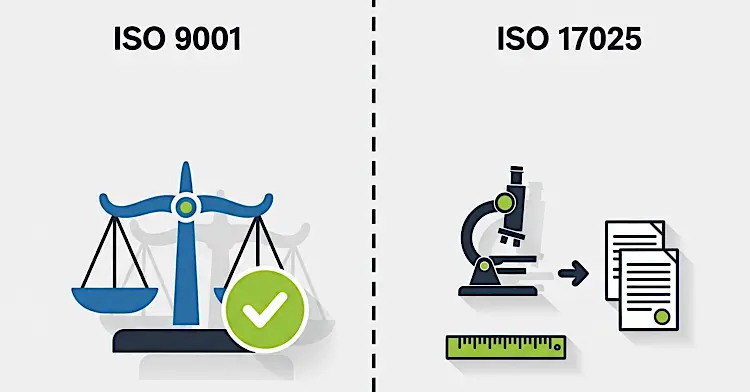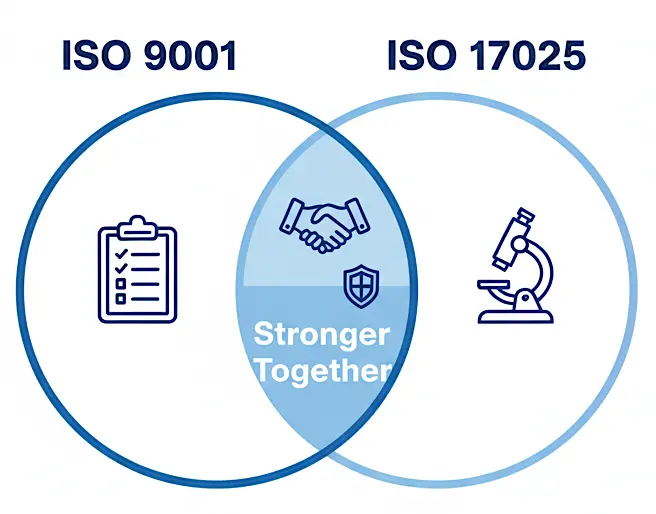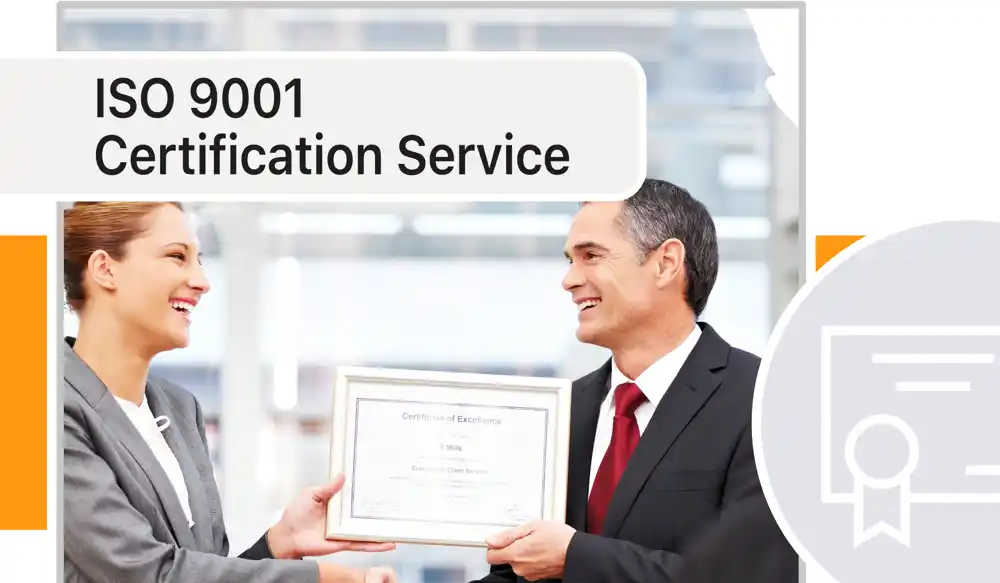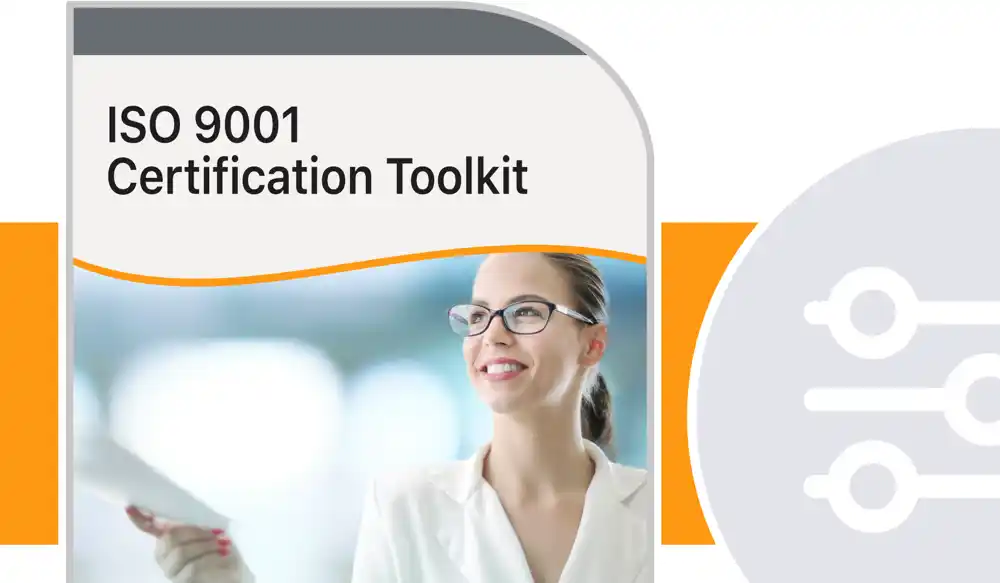ISO 17025 vs ISO 9001: Key Differences Explained
6 October 2023
ISO 17025 vs ISO 9001 is a common comparison in quality management and laboratory industries. Both standards improve trust, accuracy, and efficiency. Yet, they serve different purposes and apply to different organizations. Understanding the difference helps businesses choose the right certification for their goals.
If your company is planning ISO 9001 certification, you can save time and money with the ISO 9001 Certification Toolkit. It includes everything you need for a smooth implementation.

What is ISO 9001?
ISO 9001 is the world’s most used quality management standard. It provides a framework for companies to improve customer satisfaction, reduce errors, and meet regulatory requirements. The latest version is ISO 9001:2015, which follows the High-Level Structure (HLS).
Key features of ISO 9001:
Focus on customer satisfaction
Continuous improvement culture
Risk-based thinking
Process approach for efficiency
ISO 9001 is flexible. It applies to all industries including manufacturing, healthcare, IT, logistics, and services. More than 1 million companies in over 170 countries are certified.
What is ISO 17025?
ISO 17025 is the international standard for testing and calibration laboratories. It ensures labs produce valid and reliable results. The standard is widely used by research facilities, inspection bodies, and government labs.
Key features of ISO 17025:
Technical competence in testing and calibration
Valid and traceable measurement methods
Equipment calibration and maintenance requirements
Staff competence and training standards
Accreditation to ISO 17025 proves that a lab can produce accurate results accepted worldwide. It is often required in industries such as pharmaceuticals, construction, food safety, and environmental testing.
ISO 17025 vs ISO 9001: Core Differences
The main difference is scope. ISO 9001 focuses on overall quality management in organizations, while ISO 17025 targets the competence of laboratories.
Here are the key differences explained in plain text:
Purpose
ISO 9001 improves customer satisfaction and quality systems, while ISO 17025 ensures accuracy in testing and calibration.
Scope
ISO 9001 applies to all businesses and industries, while ISO 17025 applies only to testing and calibration labs.
Focus Areas
ISO 9001 focuses on process control, leadership, and customer needs, while ISO 17025 focuses on lab competence, methods, and measurement traceability.
Recognition
ISO 9001 certification shows commitment to quality, while ISO 17025 accreditation proves technical competence recognized internationally.
Customers
ISO 9001 is requested by general clients and regulators, while ISO 17025 is required by industries relying on test accuracy.
Both standards can work together. For example, a laboratory can be ISO 9001 certified for quality management and ISO 17025 accredited for technical testing.
ISO 9001 vs ISO 17025 Calibration
Calibration is one area where confusion often arises. ISO 9001 requires companies to ensure equipment is calibrated, but it does not specify how calibration must be done.
ISO 17025, however, sets strict rules. Calibration must be traceable, documented, and carried out by qualified personnel using validated methods. This makes ISO 17025 essential for industries where precise measurements are critical, such as aerospace, automotive, and healthcare.
If you need help with calibration compliance under ISO 9001, our ISO 9001 Certification Toolkit include ready-to-use procedures and forms.
Which Standard Should You Choose?
Choose ISO 9001 if your goal is to improve quality, customer satisfaction, and efficiency across the company.
Choose ISO 17025 if you operate a testing or calibration lab and need international recognition of your technical competence.
Some companies need both. For example:
A manufacturing company may use ISO 9001 for its production and ISO 17025 for its in-house testing lab.
A pharmaceutical firm may implement ISO 9001 across departments and ISO 17025 for laboratory operations.
Benefits of ISO 9001 Certification
Increased customer trust
Higher efficiency and lower waste
Easier regulatory compliance
Better market opportunities
Stronger internal processes
With over a million certifications worldwide, ISO 9001 is often a business requirement. Many customers demand it before signing contracts.
Our ISO 9001 Certification Service provides end-to-end support, from gap analysis to final audit.
Benefits of ISO 17025 Accreditation
Global recognition of lab competence
Accurate and reliable results
Compliance with regulatory bodies
Competitive advantage in technical fields
Improved staff training and development
ISO 17025 accreditation ensures your lab’s test results are trusted across countries and industries. For industries like aerospace or medical devices, this is non-negotiable.
Why Both Standards Matter Together
Some organizations implement both standards because they complement each other. ISO 9001 provides the management system, while ISO 17025 adds the technical assurance. Together, they create a strong foundation for trust and performance.

How to Get Started with ISO 9001
If you want to start with ISO 9001, follow these steps:
1. Conduct a gap analysis to identify missing elements.
2. Create a project plan with clear goals.
3. Develop policies and procedures.
4. Train employees at all levels.
5. Perform an internal audit and management review.
6. Apply for certification with a registrar.
Our convenient and hands-off ISO 9001 Certification Service makes this process faster and easier.

Conclusion: ISO 17025 vs ISO 9001
ISO 17025 vs ISO 9001 is not about which standard is better. It is about choosing the one that matches your business needs. ISO 9001 strengthens quality across all industries. ISO 17025 proves technical competence in laboratories. Some organizations benefit from both.
ISO 9001 is not only the most popular management system standard worldwide, it also provides an excellent foundation for ISO 17025. If you are ready to implement ISO 9001, explore our ISO 9001 Certification Toolkit or sign up for ISO 9001 Online Training. Both options give you expert guidance and proven results.


